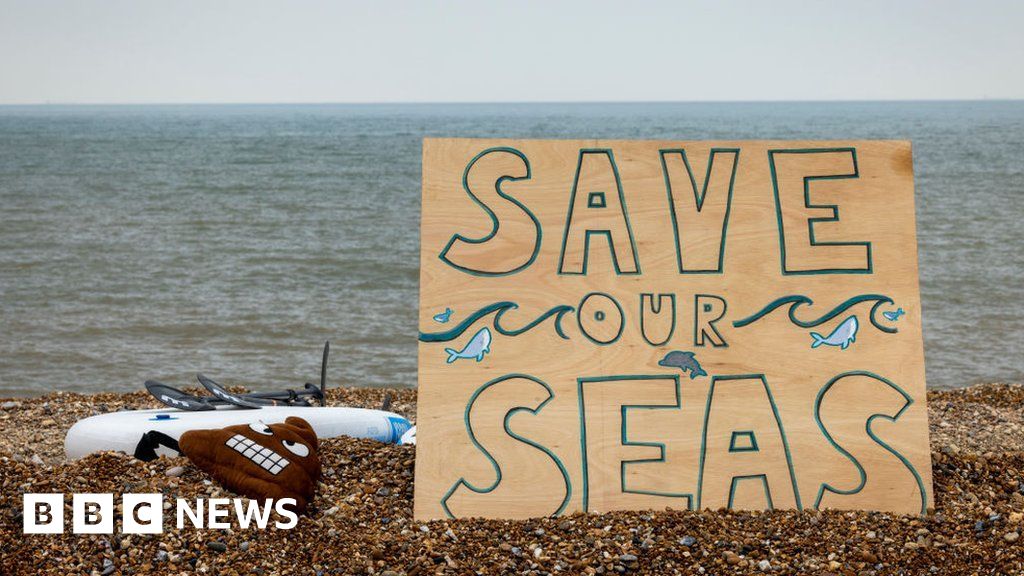Water companies spilled raw sewage into England's rivers and seas for a record 3.6 million hours in 2024, according to Environment Agency figures.
Limited amounts of sewage are allowed to be discharged during periods of excess rain, but environmental groups say the levels pose a threat to wildlife and risk swimmers' health.
A major report by the Independent Water Commission has proposed changes to regulation and monitoring of sewage spills, alongside tougher penalties.
The 3.6 million hours of sewage spills into England's lakes, rivers and seas in 2024 was a slight increase on 2023.
However, the Environment Agency said the total number of spills was down, meaning each spill lastest longer on average.
In July, separate data from the Environment Agency showed that pollution incidents by water companies - from spilled sewage and other contaminants - hit record levels in 2024.
Of these, 75 were serious incidents - where there is threat to aquatic and human health. Thames Water was responsible for 33.
Water UK, the industry body for sewerage companies, has said that spills are "unacceptable", but that it has a plan "to end water sewage flowing into all waterways", with significant infrastructure upgrades.
In Wales, the number of hours of spills was down 11% in 2024, but pollution incidents hit a 10-year high.
Northern Ireland does not currently monitor real-time spills.
Scotland only collects data from 27% of spill sites.
Most of the UK has a combined sewerage system, meaning that both rainwater and wastewater - from toilets, bathrooms and kitchens - are carried in the same pipes.
Wastewater is usually sent to a sewage treatment works.
But capacity can sometimes be exceeded during heavy rainfall, especially if dry ground cannot absorb large quantities of water.
This could lead to inundation of sewage works and potential flooding of homes, roads and open spaces.
The system is therefore designed to overflow occasionally, and discharge excess wastewater into the sea and rivers fromcombined sewer overflows.
According to industry regulator Ofwat, some water companies have been "routinely releasing sewage" outside times of heavy downpours, in breach of their permits. This is known as dry spilling.
Ofwat said this is a result of companies failing to manage their wastewater treatment plants, leading to sewage overflowing into rivers and lakes before being treated.
The BBC uncovered6,000 potential dry spills by England's water companiesin 2022.
Even if it is raining, water company permits also require them to treat a minimum amount of sewage before releasing it.
Ageing infrastructure has been identified by the industry, government and campaigners as one of the main reasons for sewage spills.
At the end of last year Ofwat agreed that water companies in England and Wales would spend a total £104bn over the next five years to make upgrades as well as secure water supplies. Of that, £20bn would specifically go to tackling sewage spills.
Water UK, the industry body, said it would be the "most ambitious modernisation of sewers since the Victorian era".
But there has been criticism from environmental campaigners that customers' bills have had to rise significantly, whilst water companies continueto pay out dividends to shareholders.
The Water Commission, headed by former deputy chair of the Bank of England Sir Jon Cunliffe, has put forward 88 recommendations for reforms.
In May 2024, a team of the UK's top engineers and scientistswarned of the growing public health risk from human faeces in the country's rivers, and called for more regular testing.
The presence of faeces can expose people to bacteria such as salmonella and E.coli, which cause diarrhoea and vomiting, or viruses like hepatitis A which can lead to liver infection.
Every week between May and September, the Environment Agency measures the water quality atbathing sitesacross England, and in some places it issues daily pollution risk forecasts.
You cansearch its websiteby location. There aresimilar websiteswhere you can find out about beaches and bathing water in Scotland, Wales or Northern Ireland.
Water UK has launched theNational Storm Overflow Hubwhere almost real-time discharges can be seen across all of England's overflow points. This does not contain data on the volume of sewage discharge or the presence of organisms carrying faecal-oral disease in the water.
Sewage spills haveonly been routinely monitoredfor a few years, so it is difficult to tell exactly how they have changed over time.
However, overall water quality has been monitored for decades. This also accounts for other sources of pollution, such as agriculture.
In May 2023, the Environment Agency said that16% of assessed surface waters in England achieved "good" ecological status, including:
Water quality is generally higherin other parts of the UK.
In Scotland, around two-thirds of surface waters are classed as having "good" ecological status.
In Wales the figure is 40%, and in Northern Ireland 31%.
Peter Prinsley says he carried out testing on the River Lark, finding high levels of ammonia.
Researchers say there is an "urgent need" for policy interventions to combat air pollution.
A Cumbrian project is selected as a finalist in the Thiess International river prize awards.
Hundreds of people attend a flood information event in a town regularly hit by river flooding.
Seals often get the toys trapped around their necks, causing pain, disease and even death.
Copyright 2025 BBC. All rights reserved.TheBBCisnot responsible for the content of external sites.Read about our approach to external linking.



 Education
Education 22 Jul, 2025
22 Jul, 2025 Jacob Castillo
Jacob Castillo